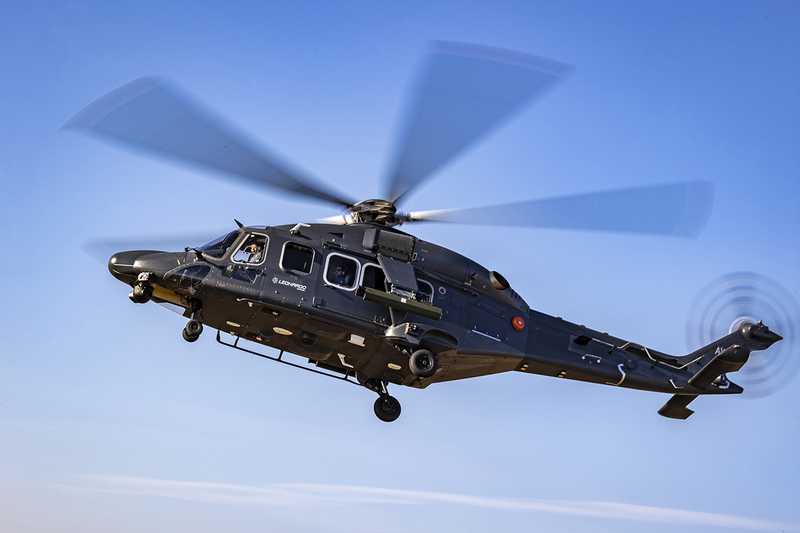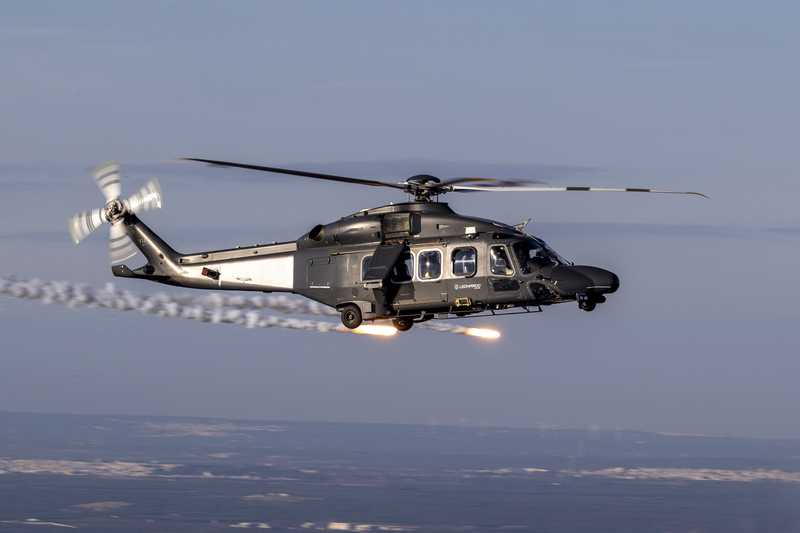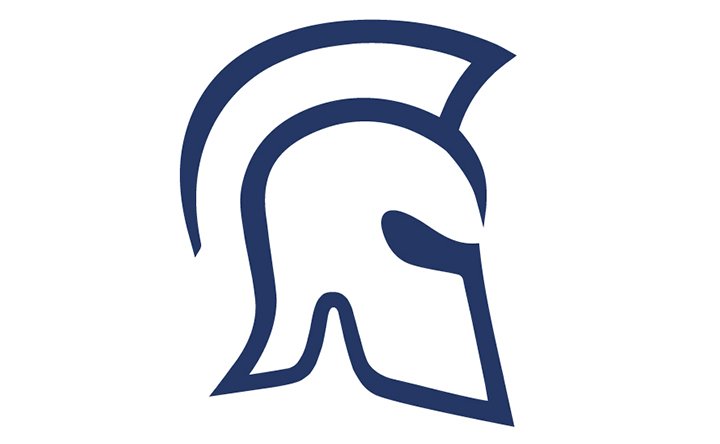AW149 Multi-Role, Multi-Missions, Multi-Environments (Sponsored)
In Q4 2021, Leonardo undertook successful weapon firing trials from the AW149 in an undisclosed European country. (All photos: Leonardo)
This article is brought to you by Leonardo.
In order to operate safely in icing conditions, certain critical areas require protection from the detrimental effect that ice build-up may have.
Ice cool
Certified in 2016 by the European Aviation Safety Agency (EASA), the Full Ice Protection System (FIPS) offered on the AW149 has been designed to provide protection against the accretion of ice during flight down to temperatures of -40°C. This capability allows operators to continue their missions safely in known icing conditions, if required; conditions which could confine other helicopters to the ground or force them to take a longer route to circumnavigate icing conditions.
The baseline AW149 is equipped with engine-air-intake anti-icing and windscreen and pitot-static heating systems, to which the FIPS adds an ice detection system, electrical power generators, and heated elements within the windshield and main and tail rotor blades.
Though manual control is available, the FIPS is fully automatic. When activated, the crew is advised via the cockpit display system upon the detection of icing conditions. The ice detection system monitors the current operating conditions, including airspeed, outside air temperature (OAT), and ice accretion rate, and provides information on the icing severity to the Ice Control Box (ICB), which then manages power distribution to the main and tail rotor blades to protect against ice buildup. Blade temperature is monitored to protect from overheating.

The FIPS has been designed to be mission installable, enabling operators to remove/install for maximum operational flexibility prior to deployment.
The development programme for an ice protection system is rightly demanding and challenging. The certification programme for the AW149 FIPS involved test aircraft performing icing trials in North Europe and North America for up to three years, accumulating over 1,600 flying hours in icing conditions.
Certification activity required the aircraft to fly into both natural and artificial icing conditions, with the support of a US Army CH-47 HISS (Helicopter Icing Spray System), under the supervision and with the involvement of the appropriate certification authorities such as EASA, FAA and TCAA.
Leonardo Helicopters is proud to be an industry leader in providing superior ice protection systems and enabling operators to safely complete their missions in the most demanding environments. Leonardo’s engineering excellence ensures complex systems maintain the already impressive operational flexibility of the AW149 without imposing component penalty factors or diminishing the aircraft’s operational weight envelope. The AW149 is our latest generation medium multi-role battlefield helicopter and provides true all-weather capability.

Fired-up
Leonardo continues to integrate weapon systems based on evolving market requirements. In Q4 2021, Leonardo undertook successful weapon firing trials from the AW149 in an undisclosed European country. The aircraft, a company-owned AW149 demonstrator, conducted rocket firing trials (unguided and Laser Guided).
The flight trials assessed:
· safe separation of Laser Guided Rockets from the hover and forward flight;
· refinement of the unguided Rocket cockpit firing solution symbology to further aid accuracy;
· impact on EO and NVG performance during night ripple firings of unguided rockets.
Advanced platform and system technologies, equipment and weapons; coupled with unparalleled safety and performance, and high levels of survivability and crashworthiness; provides military customers with a highly effective, survivable and cost-effective capability.
UK Ready
In relation to the UK MoD’s New Medium Helicopter requirement, Leonardo is putting forward its AW149, which would be built in Yeovil should the company be successful in winning the competition. The AW149 is ready for demanding missions in the most severe operational environments and, following extensive evaluation work, Leonardo believes it to be the ideal solution for the UK's requirement.
As the Home of British Helicopters, Leonardo is the only company with UK onshore helicopter design skills and experience, with its unique end to end capability this enables responsive support to customers with urgent operational requirements.
End to End
Leonardo is one of very few organisations in the world, and the only one in the UK, with an end-to-end capability. End-to-end means the design, development, manufacture, testing, and certification of helicopters as well as the subsequent training and support for customers.
This enables Leonardo to move at pace and with its existing UK MoD relationship; it could progress the New Medium Helicopter aircraft into service within the 2025 timeframe.
From the outset, the development of the AW149 has been shared between Leonardo’s helicopter facilities in Yeovil and Milan. During its development phase, over 800,000 hours of engineering activity were clocked up in Somerset, which equates to an equivalent of 50 person years of engineering activity.
The majority of the whole structural design was undertaken in the UK and because of that engineering investment, the design and build of blades and transmission is still onsite in Yeovil today. Therefore, in terms of AW149 development, Leonardo has integrated expertise at the Yeovil site that continues to this day.
The skills that Leonardo has in Yeovil support the UK MoD’s necessity to have Freedom of Action and operational advantage. The company has a proven ability to support Urgent Operational Requirements (UORs) that the UK MoD might find that they need when they move into active theatre.

During past conflicts, Leonardo has supported large numbers of UORs, including the British Army’s Apache.
Therefore, Leonardo can support the MoD locally, which means it can respond in a very quick timescale and enables the company to put the UK MoD’s requirements at the height of our priority list.
To give some context to this close working relationship, during Operations Telic and Herrick Leonardo was involved in more than 50 UORs. These were across defensive aids suites, weapons installations, performance, re-engine platforms and communications, and were not exclusive to the platforms. The UK MoD also came forward for support on other platforms, such as the Chinook and Puma.
Furthermore, Test Pilots at Leonardo in Yeovil have served and some have flown in the aircraft type that is being replaced. This means Leonardo has that operational understanding of what is being conducted today and what the operator might want to do in the future.
The company is well practiced in delivering the evidence MoD requires to grant the ‘Release to Service’ in a swift and effective manner.— Leonardo
A critical area for this is in the achievement of Instructional Systems Design, Leonardo has been through the UK MoD Military Air Systems Certification Process (MACP) recently with both Crowsnest and the Merlin Life Sustainable Programme (MLSP) aircraft. This means the company is well practiced in delivering the evidence MoD requires to grant the ‘Release to Service’ in a swift and effective manner. This same procedure was undertaken for the Future Anti-Surface Guided Weapon (FASGW) modification to Wildcat.
Leonardo has a deep understanding of the UK’s certification requirements. There is an expectation that the NMH requirement will need compliance to the UK Defence Standards requirements. In Yeovil, the company has the full scope of approvals to design and develop aircraft.
Leonardo has a deep understanding of the UK’s certification requirements. There is an expectation that the NMH requirement will need compliance to the UK Defence Standards requirements. In Yeovil, the company has the full scope of approvals to design and develop aircraft here in Yeovil.
Many of Leonardo’s engineers are co-located with the customer’s delivery team, which enables immediate communication. This means that Leonardo is able to be more reactive to what the UK customer wants.
Team AW149 UK
Leonardo has stated that should the UK MoD acquire the AW149 for the NMH requirement then the company’s target is to grow existing production levels of the platform to over 60%. This will be supported by an expansion of the UK supply chain. In September 2021, Leonardo announced members to its Team AW149 UK. Each Team AW149 UK member provides a vital component to the existing AW149 platform, from lights to avionics systems and other hardware and software components.
The company has an established UK supply chain with 70 strong suppliers spread across the union. Leonardo sees the NMH opportunity as a way to grow that footprint further. This would represent an investment in UK skills, design and manufacturing and support thousands of jobs across the country in towns and cities from South Shields to Gosport.
To learn more, click here.
More from Industry Spotlights
-
![The power of partnership: GDMS–UK deepens cooperation with the British Army]()
The power of partnership: GDMS–UK deepens cooperation with the British Army
In Conversation: Shephard's Gerrard Cowan talks to General Dynamics Mission Systems–United Kingdom’s Chris Burrows about how the company's UK TacCIS business is reshaping battlefield communications through sustained customer engagement, accelerated innovation and ecosystem collaboration.
-
![Expanded focus – unleashing the potential of commercial SATCOM for defence]()
Expanded focus – unleashing the potential of commercial SATCOM for defence
In conversation... Intelsat's Ray Lindenmayer talks to Shephard's Gerrard Cowan about the new capabilities advanced commercial SATCOM technologies can provide for military customers, and how industry and government can best work together to achieve maximum effect in orbit.
-
![Enhancing education: How CAE is embracing new technology to boost military training]()
Enhancing education: How CAE is embracing new technology to boost military training
In Conversation... Shephard's Gerrard Cowan talks to CAE's Marc-Olivier Sabourin about how the training and simulation industry can help militaries achieve essential levels of readiness by leveraging new technology, innovative procurement methods and a truly collaborative approach.
-
![Why tactical UAVs are winning on the future battlefield (Podcast)]()
Why tactical UAVs are winning on the future battlefield (Podcast)
In Conversation: In this special edition of the Shephard Defence Podcast, Tony Skinner sits down with Dan Slasky, President and CEO of Aeronautics, to explore how cutting-edge tactical unmanned aerial systems are reshaping today’s battlefields.
-
![Fincantieri’s Vulcano Class: a new era of versatility and innovation in naval operations]()
Fincantieri’s Vulcano Class: a new era of versatility and innovation in naval operations
Logistic support ships (LSS) are essential for sustained naval operations, especially during extended deployments far from home ports.
-
![Need more flexibility in battle management system delivery?]()
Need more flexibility in battle management system delivery?
Systematic’s newest solution, SitaWare BattleCloud, brings greater flexibility to combat information systems and C4ISR.






















